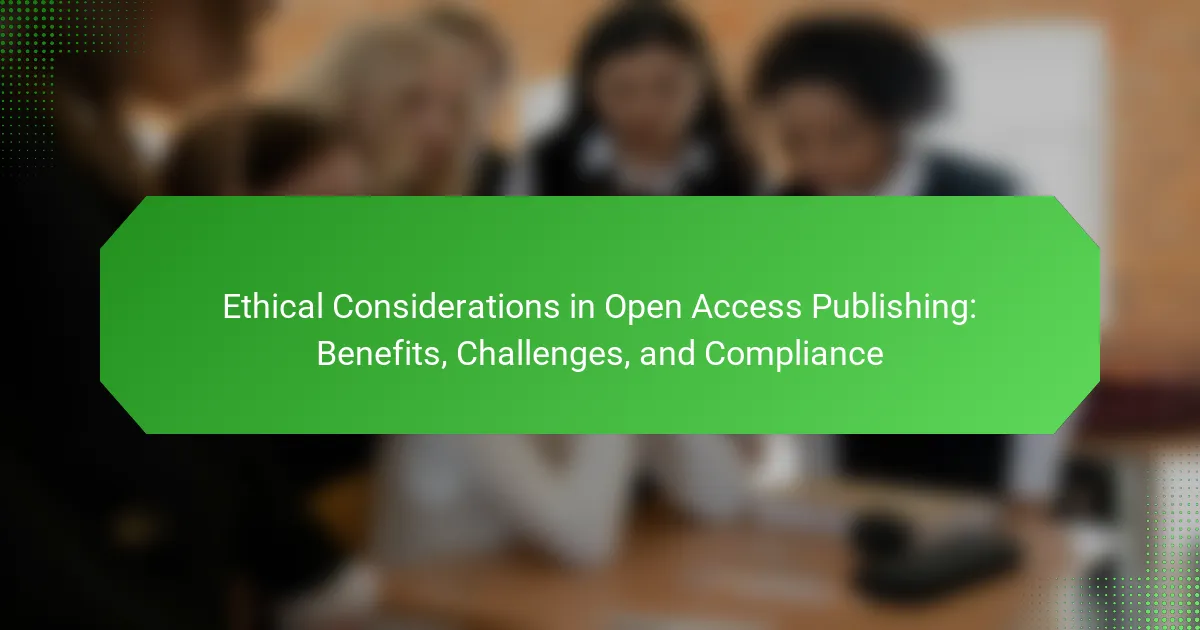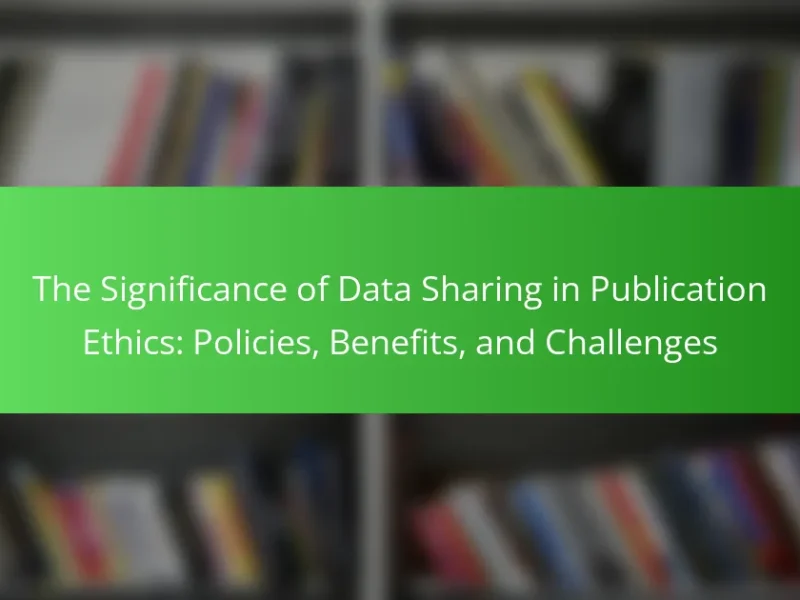Ethical considerations in open access publishing encompass accessibility, quality control, and funding model sustainability. Accessibility promotes equitable access to research, while quality control addresses the risks of predatory journals that may compromise rigorous peer review. The sustainability of funding models raises concerns about potential biases affecting research outcomes, alongside copyright issues that authors must navigate. Additionally, transparency in the peer review process is essential for maintaining trust in scholarly communication. The article will explore these ethical considerations, the challenges faced by open access publishing, and the importance of compliance with established guidelines to uphold integrity and credibility in the field.
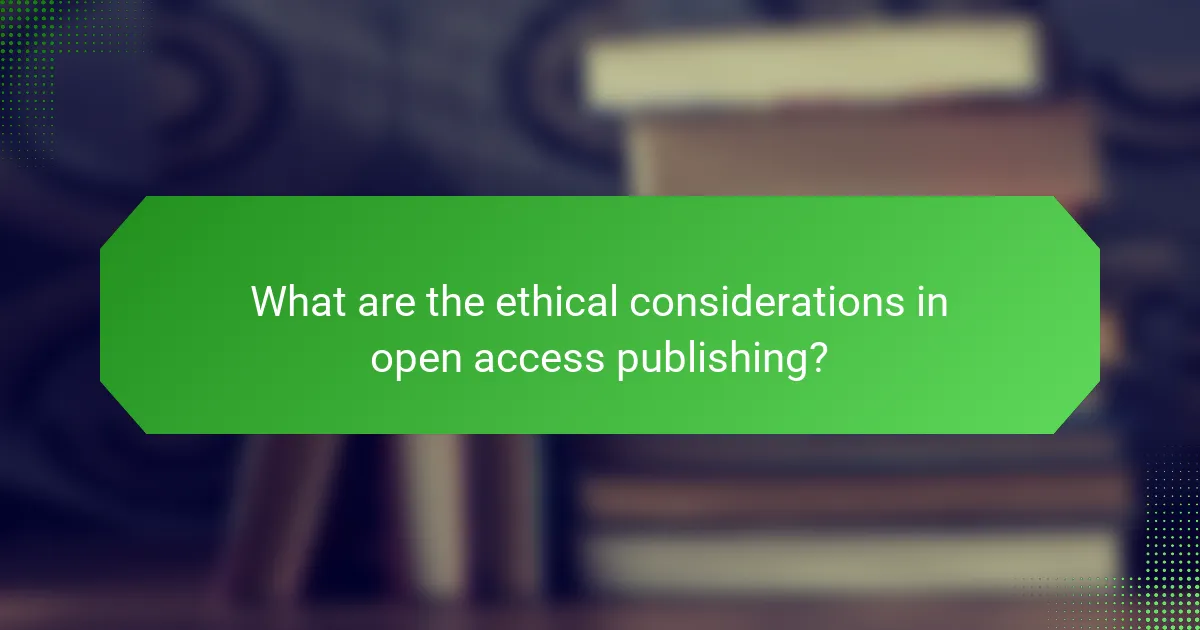
What are the ethical considerations in open access publishing?
Ethical considerations in open access publishing include issues of accessibility, quality control, and the sustainability of funding models. Accessibility ensures that research is available to all, promoting equity in knowledge dissemination. Quality control is crucial, as open access can sometimes lead to predatory journals that lack rigorous peer review. Sustainability of funding models raises concerns about potential biases from sponsors influencing research outcomes. Additionally, authors must consider copyright issues when choosing to publish openly. Transparency in the peer review process is also essential to maintain trust in the scholarly communication system. These considerations are vital for maintaining the integrity and credibility of open access publishing.
Why is ethical publishing important in the context of open access?
Ethical publishing is crucial in open access because it ensures transparency and integrity in research dissemination. Open access models promote free access to research, which can lead to increased visibility and citation of scholarly work. However, without ethical standards, the quality of published research may suffer. This can result in the spread of misinformation or unverified findings. Ethical publishing practices, such as peer review and conflict of interest disclosures, help maintain trust in scholarly communication. Studies have shown that adherence to ethical guidelines enhances the credibility of open access journals. For instance, the Committee on Publication Ethics (COPE) provides frameworks that support ethical practices in publishing. By following these guidelines, open access can fulfill its promise of equitable access to reliable knowledge.
What are the key principles of ethical publishing?
The key principles of ethical publishing include transparency, integrity, and accountability. Transparency involves clear disclosure of funding sources and conflicts of interest. Integrity requires the accuracy of data and honesty in authorship contributions. Accountability means that publishers and authors must take responsibility for their work. Ethical publishing also encompasses peer review processes that are fair and unbiased. Adherence to these principles fosters trust in the academic community. Ethical guidelines, such as those from the Committee on Publication Ethics (COPE), provide frameworks for maintaining these standards.
How do ethical considerations impact research integrity?
Ethical considerations significantly impact research integrity by guiding researchers to conduct studies responsibly. They promote honesty and transparency in data collection and reporting. Ethical guidelines also help prevent misconduct such as plagiarism and fabrication of results. Compliance with ethical standards ensures that research findings are credible and trustworthy. A study by Resnik (2015) highlights that adherence to ethical practices enhances the quality of research outcomes. Furthermore, ethical considerations foster public trust in scientific research. This trust is crucial for the acceptance and application of research findings in society.
What benefits does open access publishing provide?
Open access publishing provides numerous benefits, including increased accessibility to research. It allows anyone with internet access to read and use scholarly articles without subscription fees. This model promotes wider dissemination of knowledge. Studies show that open access articles are cited more frequently than those behind paywalls. For example, a 2016 study published in PLOS ONE found that open access articles received 18% more citations. Additionally, open access publishing supports collaboration and innovation by facilitating knowledge sharing among researchers. It enhances the visibility of research, leading to greater public engagement and impact. Overall, open access publishing democratizes access to information and fosters a more inclusive academic environment.
How does open access publishing enhance accessibility to research?
Open access publishing enhances accessibility to research by removing paywalls that restrict access to academic articles. This model allows anyone with internet access to read and use research findings. According to the Directory of Open Access Journals, over 15,000 journals are available in this format. Studies show that open access articles receive more citations than subscription-based ones. This increased visibility promotes wider dissemination of knowledge. Researchers from various institutions can collaborate more easily, leading to innovative discoveries. Open access also supports public engagement with science, allowing non-experts to access and understand research. Overall, it democratizes knowledge and fosters a more informed society.
What role does open access play in the dissemination of knowledge?
Open access plays a crucial role in the dissemination of knowledge by removing financial barriers to access scholarly research. This model allows anyone to read, download, and share research findings without subscription fees. According to the Directory of Open Access Journals (DOAJ), open access increases the visibility and reach of research, leading to higher citation rates. Studies show that articles published in open access journals are cited 18% more than those in subscription-based journals. Furthermore, open access fosters collaboration and innovation by enabling researchers worldwide to access and build upon existing knowledge. This democratization of information supports equitable access to knowledge, which is essential for advancing education and research globally.
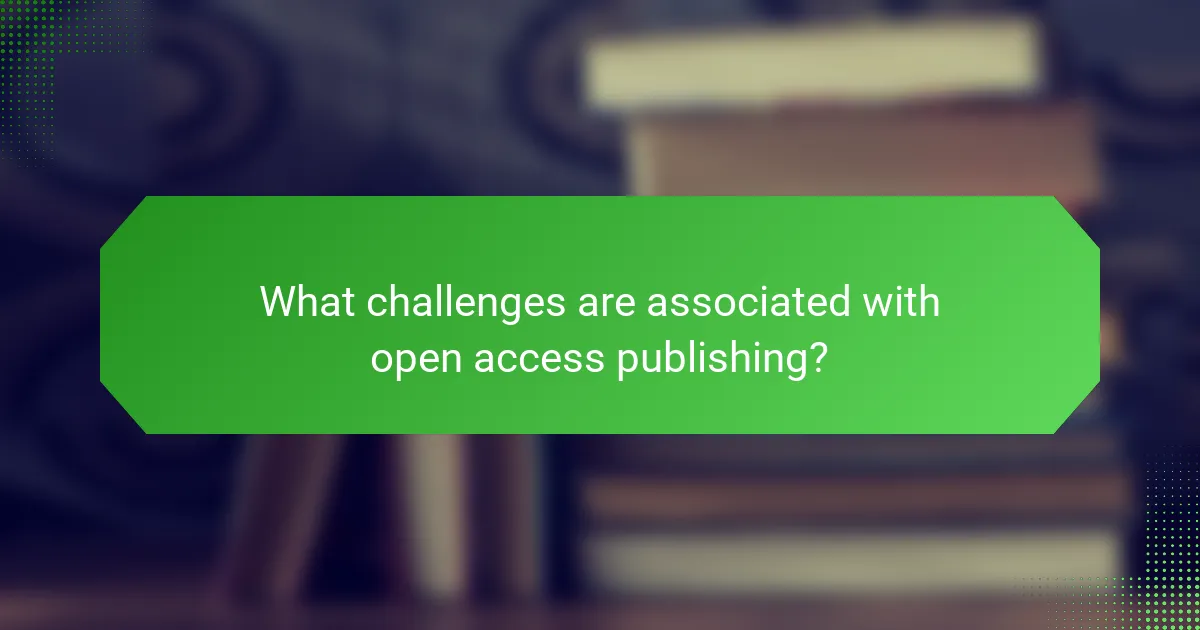
What challenges are associated with open access publishing?
Open access publishing faces several challenges. One significant challenge is the financial sustainability of journals. Many rely on article processing charges, which can limit access for authors without funding. Another challenge is the quality control of published research. Some open access journals may not adhere to rigorous peer review standards. This can lead to the dissemination of low-quality or misleading research. Additionally, there is a concern regarding the visibility and discoverability of open access articles. Not all researchers are aware of or know how to access open access content. Finally, copyright and licensing issues can complicate the sharing and reuse of research. These challenges can impact the overall effectiveness and credibility of open access publishing.
What financial models are used in open access publishing?
Open access publishing utilizes several financial models. The most common model is the Article Processing Charge (APC) model. In this model, authors or their institutions pay a fee to publish their work openly. This fee covers the costs of peer review, editing, and distribution. Another model is the Subscription-Based Open Access, where journals maintain a subscription fee but allow selected articles to be open access. The Institutional Repository model allows institutions to support open access by funding the publication costs for their researchers. Additionally, some publishers adopt a “Diamond” or “Platinum” model, where no fees are charged to authors or readers, often funded by institutions or grants. A study published in 2021 by the International Association of Scientific, Technical and Medical Publishers outlines these models and their implications for sustainability in open access publishing.
How do article processing charges (APCs) affect authors?
Article processing charges (APCs) significantly affect authors by imposing financial costs for publishing their work in open access journals. Authors must pay these fees to ensure their articles are freely accessible to the public. The typical APC ranges from $500 to over $3,000, depending on the journal’s reputation and impact factor. This financial burden can limit participation for researchers with limited funding. Consequently, authors from well-funded institutions may have an advantage over those from smaller or underfunded organizations. Additionally, the existence of APCs can influence the choice of publication venues, potentially steering authors toward journals with higher fees. This can create disparities in visibility and accessibility of research outputs. In some cases, authors may seek alternative funding sources or institutional support to cover these costs. Overall, APCs play a crucial role in shaping the publishing landscape for authors in open access environments.
What are the implications of funding sources on research bias?
Funding sources can significantly influence research bias. Research funded by organizations with vested interests may lead to biased outcomes. For instance, studies funded by pharmaceutical companies often report favorable results for their products. A 2017 analysis found that industry-sponsored research is more likely to produce results that align with the sponsor’s interests. This can skew public perception and policy decisions. Additionally, researchers may feel pressured to produce positive findings to secure future funding. Transparency in funding sources is crucial to mitigate potential bias. Journals increasingly require disclosure of funding to promote accountability.
What issues arise regarding copyright and licensing in open access?
Copyright and licensing issues in open access primarily involve the ownership and distribution of published works. Authors often retain copyright but must navigate licensing agreements that dictate how their work can be shared. These agreements can vary widely, leading to confusion about permissions and restrictions. Additionally, some open access models require authors to pay fees, which can limit access for those without funding. Misunderstandings about copyright can also result in unauthorized use of content, infringing on the rights of authors. Studies indicate that many researchers are unaware of the specific licensing terms associated with their publications. This lack of awareness can hinder the intended benefits of open access, such as broad dissemination and collaboration.
How do different licenses impact the sharing of research?
Different licenses significantly impact the sharing of research by dictating how others can use, distribute, and modify the work. For instance, Creative Commons licenses allow authors to specify permissions, which can facilitate broader sharing and collaboration. A license like CC BY enables others to share and adapt the research, provided proper attribution is given. Conversely, a more restrictive license, such as CC BY-NC, limits use to non-commercial purposes, potentially reducing dissemination. Research shows that open-access articles under permissive licenses receive higher citation rates, indicating broader visibility and impact. Thus, the choice of license can directly influence the accessibility and reach of research findings.
What are the risks of copyright infringement in open access?
Copyright infringement in open access can lead to legal consequences and financial penalties. Unauthorized use of copyrighted material may result in lawsuits from original authors or publishers. Open access platforms may face reputational damage if they host infringing content. Researchers risk losing their credibility if they are associated with copyright violations. Additionally, infringing publications can be retracted, impacting academic careers. Compliance with copyright laws is essential to avoid these risks. According to the Copyright Clearance Center, 70% of researchers are unaware of copyright restrictions. This lack of awareness increases the likelihood of infringement in open access environments.
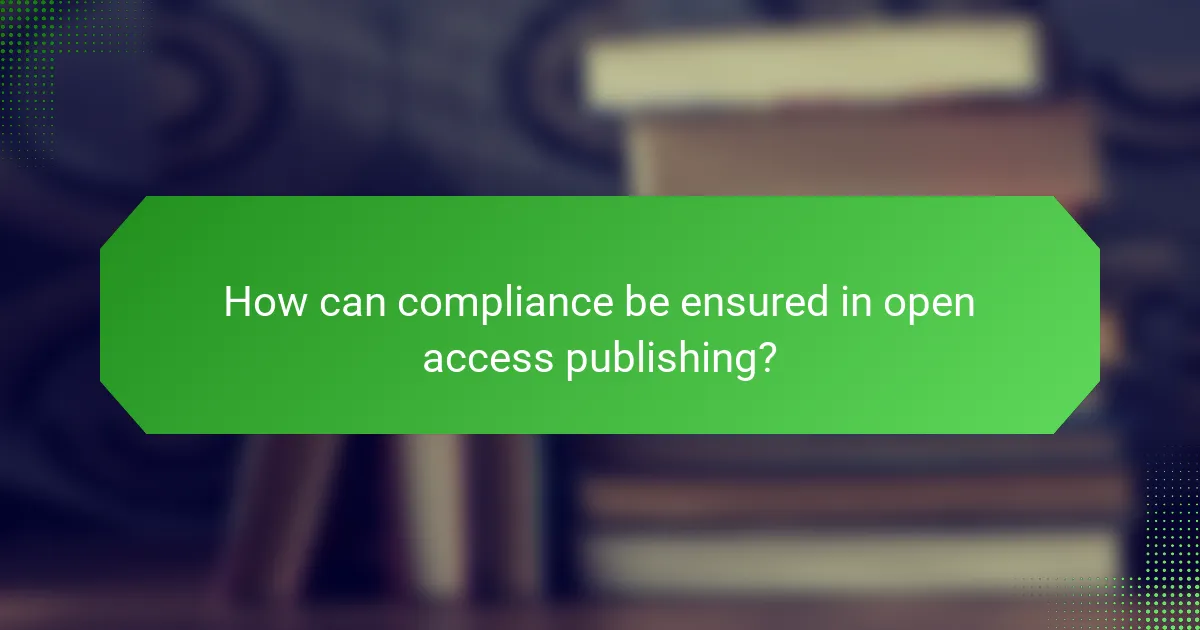
How can compliance be ensured in open access publishing?
Compliance in open access publishing can be ensured through adherence to established guidelines and standards. Publishers should follow the principles set by organizations like the Open Access Scholarly Publishers Association (OASPA). This includes transparency in funding, peer review processes, and licensing. Additionally, implementing robust copyright policies protects authors’ rights and ensures proper attribution. Regular audits and assessments can help maintain compliance with these standards. Furthermore, engaging with stakeholders, including authors and institutions, fosters a culture of compliance. Training and resources for authors on open access requirements also contribute to adherence. These measures collectively reinforce the integrity and ethical standards of open access publishing.
What regulations govern open access publishing practices?
Open access publishing practices are governed by various regulations and policies. Key regulations include the Budapest Open Access Initiative, which promotes free access to research outputs. The Plan S initiative, launched by cOAlition S, mandates that publicly funded research must be published in compliant open access journals. Additionally, the Sherman Act in the United States addresses anti-competitive practices in publishing. The European Union’s Copyright Directive also influences open access by facilitating the use of research. These regulations aim to enhance the accessibility and dissemination of scholarly work.
How do institutions ensure compliance with open access mandates?
Institutions ensure compliance with open access mandates through various strategies. They develop clear policies that outline the requirements for open access publishing. These policies often specify which types of research outputs must be made openly accessible. Institutions provide support services to assist researchers in navigating these requirements. This includes guidance on selecting appropriate open access journals. They may also establish repositories to host and disseminate research outputs. Compliance is monitored through reporting mechanisms that track adherence to open access policies. Institutions often provide training and resources to educate researchers about open access benefits and obligations. Regular audits may be conducted to assess compliance levels and identify areas for improvement.
What are the consequences of non-compliance in open access publishing?
Non-compliance in open access publishing can lead to significant consequences. These include loss of funding opportunities from institutions and grants. Publishers may impose penalties, including withdrawal of published articles. Researchers may face reputational damage, affecting future collaborations. Non-compliance can also result in limited visibility for research outputs. Additionally, it can hinder access to vital resources and support from the academic community. Compliance is essential to maintain integrity and trust in the research ecosystem.
What best practices can authors follow in open access publishing?
Authors should adhere to several best practices in open access publishing. First, they must choose reputable open access journals that follow ethical guidelines. This ensures their work is published with integrity. Second, authors should understand and comply with the journal’s copyright and licensing policies. This protects their rights and the rights of their work. Third, they should ensure transparency in funding sources and potential conflicts of interest. This builds trust in their research. Fourth, authors should engage in proper peer review processes. This enhances the quality and credibility of their work. Lastly, they should promote their published work through various platforms. This increases visibility and accessibility to a wider audience. Following these practices can significantly enhance the impact and integrity of their research in the open access landscape.
How can authors choose reputable open access journals?
Authors can choose reputable open access journals by evaluating several key factors. First, they should check if the journal is indexed in recognized databases like Scopus or Web of Science. This indexing often indicates a level of credibility and quality. Second, authors can review the journal’s editorial board. A strong board with established scholars in the field suggests a commitment to quality. Third, authors should assess the journal’s peer review process. A rigorous peer review system enhances the reliability of published work. Fourth, they can investigate the journal’s publication fees. Excessive fees may indicate predatory practices. Fifth, authors should read recent articles to gauge the quality and relevance of the content. Lastly, consulting resources like the Directory of Open Access Journals (DOAJ) can help identify trustworthy journals. These steps collectively guide authors in selecting reputable open access journals.
What strategies can be employed to navigate the open access landscape?
Developing a clear understanding of open access publishing is essential for navigating the landscape. Familiarize yourself with different open access models, such as gold and green open access. Assess the credibility of open access journals by checking their indexing status and editorial board composition. Utilize tools like the Directory of Open Access Journals (DOAJ) to find reputable sources. Engage with institutional support services for guidance on compliance and funding opportunities. Stay informed about copyright policies and licensing agreements to protect your work. Participate in open access advocacy groups to share knowledge and best practices. These strategies collectively enhance the ability to effectively navigate the open access publishing environment.
Ethical considerations in open access publishing encompass accessibility, quality control, funding sustainability, and copyright issues, all crucial for maintaining research integrity. The article explores the importance of ethical publishing practices, including transparency and accountability, which enhance trust in scholarly communication. It also addresses the benefits of open access, such as increased visibility and citation rates, alongside challenges like financial sustainability and quality control. Furthermore, the article outlines best practices for authors and institutions to ensure compliance with open access mandates and discusses the implications of funding sources on research bias.
